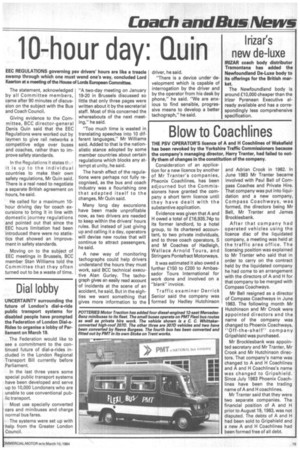10-hour day: Guin
Page 23

If you've noticed an error in this article please click here to report it so we can fix it.
EEC REGULATIONS governing psv drivers' hours are like a treacle swamp through which one must wend one's way, concluded Lord Kearton at a meeting of the House of Lords European Committee.
The statement, acknowledged by all Committee members, came after 90 minutes of discussion on the subject with the Bus and Coach Council.
Giving evidence to the Committee, BCC director-general Denis Quin said that the EEC Regulations were worked out by laymen to give rail networks a competitive edge over buses and coaches, rather than to improve safety standards.
In the Regulations it states ti it is up to the individual countries to make their own safety regulations, Mr Quin said. There is a real need to negotiate a separate British agreement on hours, he said.
He called for a maximum 10hour driving day for coach excursions to bring it in line with domestic journey regulations and pointed out that since the EEC hours limitation had been introduced there were no statistics that showed an improvement in safety standards.
Moving on to the subject of EEC meetings in Brussels, BCC member Stan Williams told the Committee that they often turned out to be a waste of time. "A two-day meeting on January 19-20 in Brussels discussed so little that only three pages were written about it by the secretarial staff. Most of this concerned the whereabouts of the next meeting," he said.
"Too much time is wasted in translating speeches into 10 different languages," Mr Williams said. Added to that is the nationalistic stance adopted by some member countries about certain regulations which blocks any attempt at unity, he said.
The harsh effect of the regulations were perhaps not fully recognised, as the bus and coach industry was a flourishing one that adapted itself to the changes, Mr Quin said.
Many long day excursions have been made unprofitable now, as two drivers are needed to keep within the drivers' hours rules. But instead of just giving up and calling it a day, operators will devise new routes that will continue to attract passengers, he said.
A new way of monitoring tachographs could help drivers understand the hours they must work, said BCC technical executive Alan Gurley. The tachograph gives an easily read account of incidents at the scene of an accident, he said, But in the eighties we want something that gives more information to the driver, he said.
"There is a device under development which is capable of interrogation by the driver and by the operator from his desk by phone," he said. "We are anxious to find sensible, progressive means to develop a better tachograph," he said.




























































































